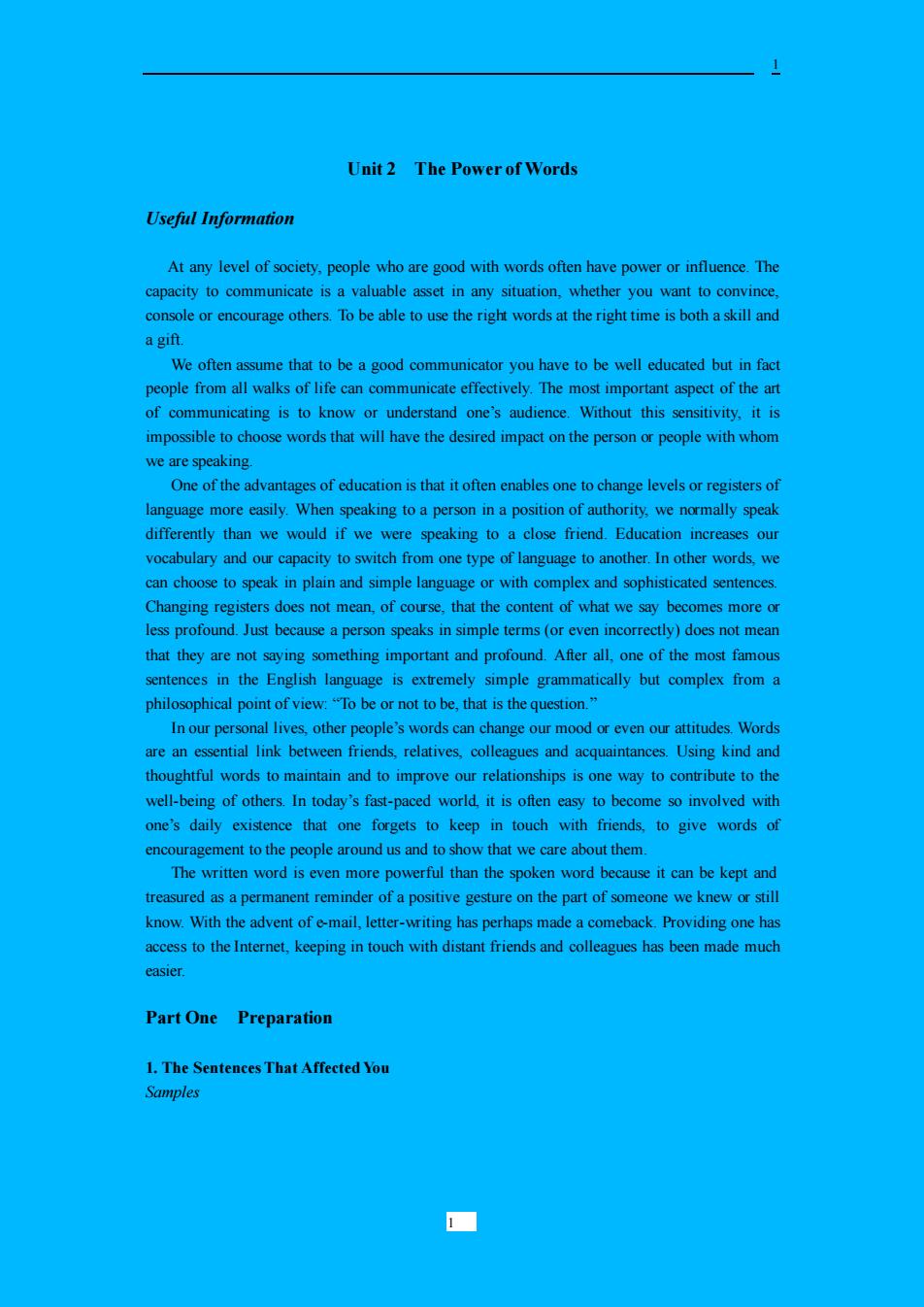
Unit 2 The Power of Words Useful Information At any level of society,people who are good with words often have power or influence.The capacity to communicate is a valuable asset in any situation,whether you want to convince, console or encourage others.To be able to use the right words at the right time is both a skill and a gift. We often assume that to be a good communicator you have to be well educated but in fact people from all walks of life can communicate effectively.The most important aspect of the art of communicating is to know or understand one's audience.Without this sensitivity,it is impossible to choose words that will have the desired impact on the person or people with whom we are speaking One of the advantages of education is that it often enables one to change levels or registers of language more easily.When speaking to a person in a position of authority,we normally speak differently than we would if we were speaking to a close friend.Education increases our vocabulary and our capacity to switch from one type of language to another.In other words,we can choose to speak in plain and simple language or with complex and sophisticated sentences. Changing registers does not mean,of course,that the content of what we say becomes more or less profound.Just because a person speaks in simple terms(or even incorrectly)does not mean that they are not saying something important and profound.After all,one of the most famous sentences in the English language is extremely simple grammatically but complex from a philosophical point of view:"To be or not to be,that is the question." In our personal lives,other people's words can change our mood or even our attitudes.Words are an essential link between friends,relatives,colleagues and acquaintances.Using kind and thoughtful words to maintain and to improve our relationships is one way to contribute to the well-being of others.In today's fast-paced world,it is often easy to become so involved with one's daily existence that one forgets to keep in touch with friends,to give words of encouragement to the people around us and to show that we care about them. The written word is even more powerful than the spoken word because it can be kept and treasured as a permanent reminder of a positive gesture on the part of someone we knew or still know.With the advent of e-mail,letter-writing has perhaps made a comeback.Providing one has access to the Internet,keeping in touch with distant friends and colleagues has been made much easier. Part One Preparation 1.The Sentences That Affected You Samples
1 1 Unit 2 The Power of Words Useful Information At any level of society, people who are good with words often have power or influence. The capacity to communicate is a valuable asset in any situation, whether you want to convince, console or encourage others. To be able to use the right words at the right time is both a skill and a gift. We often assume that to be a good communicator you have to be well educated but in fact people from all walks of life can communicate effectively. The most important aspect of the art of communicating is to know or understand one’s audience. Without this sensitivity, it is impossible to choose words that will have the desired impact on the person or people with whom we are speaking. One of the advantages of education is that it often enables one to change levels or registers of language more easily. When speaking to a person in a position of authority, we normally speak differently than we would if we were speaking to a close friend. Education increases our vocabulary and our capacity to switch from one type of language to another. In other words, we can choose to speak in plain and simple language or with complex and sophisticated sentences. Changing registers does not mean, of course, that the content of what we say becomes more or less profound. Just because a person speaks in simple terms (or even incorrectly) does not mean that they are not saying something important and profound. After all, one of the most famous sentences in the English language is extremely simple grammatically but complex from a philosophical point of view: “To be or not to be, that is the question.” In our personal lives, other people’s words can change our mood or even our attitudes. Words are an essential link between friends, relatives, colleagues and acquaintances. Using kind and thoughtful words to maintain and to improve our relationships is one way to contribute to the well-being of others. In today’s fast-paced world, it is often easy to become so involved with one’s daily existence that one forgets to keep in touch with friends, to give words of encouragement to the people around us and to show that we care about them. The written word is even more powerful than the spoken word because it can be kept and treasured as a permanent reminder of a positive gesture on the part of someone we knew or still know. With the advent of e-mail, letter-writing has perhaps made a comeback. Providing one has access to the Internet, keeping in touch with distant friends and colleagues has been made much easier. Part One Preparation 1. The Sentences That Affected You Samples
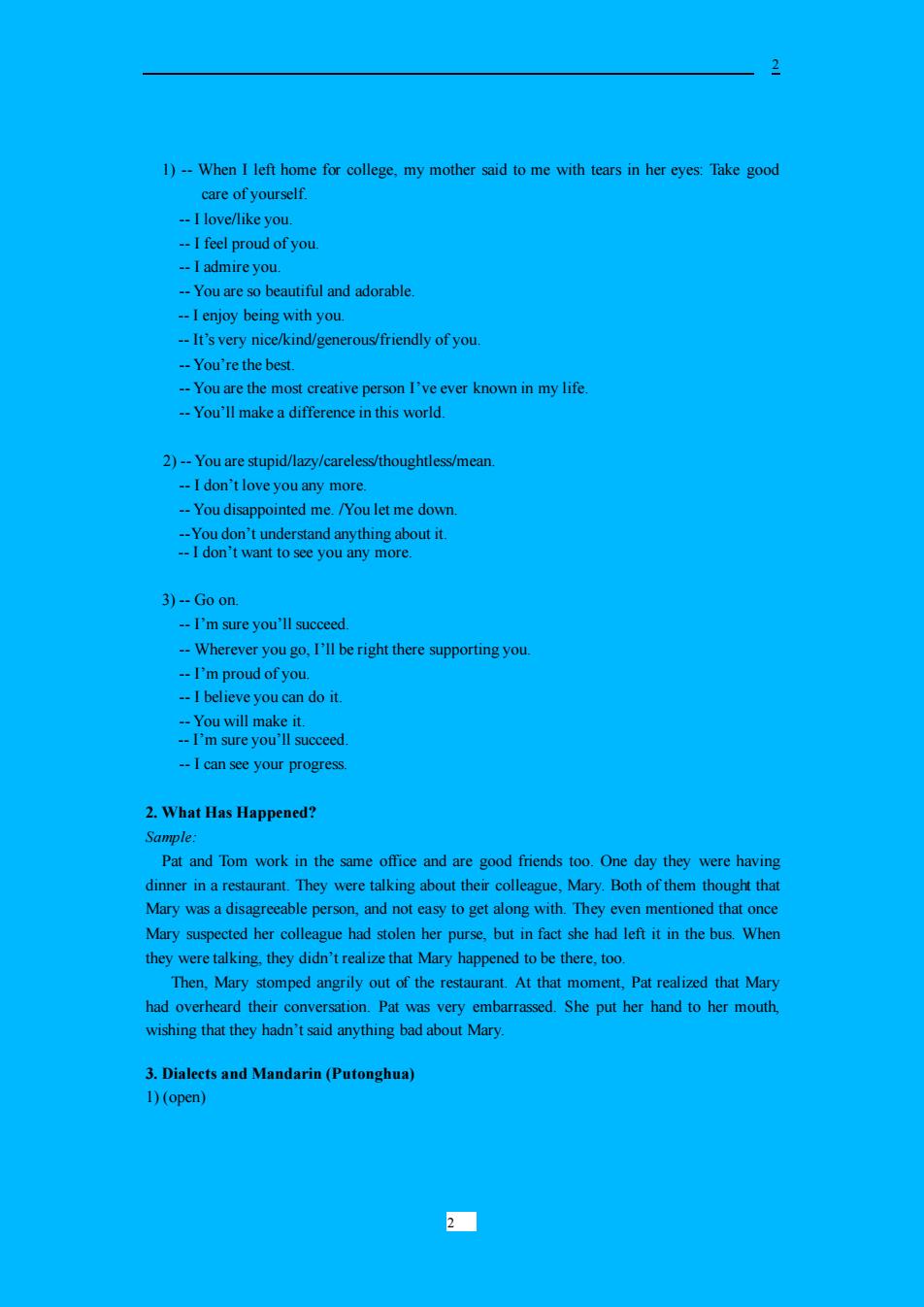
2 1)--When I left home for college,my mother said to me with tears in her eyes:Take good care of yourself. --I love/like you. --I feel proud of you. --I admire you. --You are so beautiful and adorable --I enjoy being with you. --It's very nice/kind/generous/friendly of you --You're the best. --You are the most creative person I've ever known in my life. --You'll make a difference in this world. 2)--You are stupid/lazy/careless/thoughtless/mean. --I don't love you any more. --You disappointed me./You let me down. --You don't understand anything about it. --I don't want to see you any more. 3)-G00n --I'm sure you'll succeed. --Wherever you go,I'll be right there supporting you. --I'm proud of you. --I believe you can do it. --You will make it. --I'm sure you'll succeed. --I can see your progress. 2.What Has Happened? Sample: Pat and Tom work in the same office and are good friends too.One day they were having dinner in a restaurant.They were talking about their colleague,Mary.Both of them thought that Mary was a disagreeable person,and not easy to get along with.They even mentioned that once Mary suspected her colleague had stolen her purse,but in fact she had left it in the bus.When they were talking,they didn't realize that Mary happened to be there,too. Then,Mary stomped angrily out of the restaurant.At that moment,Pat realized that Mary had overheard their conversation.Pat was very embarrassed.She put her hand to her mouth, wishing that they hadn't said anything bad about Mary. 3.Dialects and Mandarin (Putonghua) 1)(open) 2
2 2 1) -- When I left home for college, my mother said to me with tears in her eyes: Take good care of yourself. -- I love/like you. -- I feel proud of you. -- I admire you. -- You are so beautiful and adorable. -- I enjoy being with you. -- It’s very nice/kind/generous/friendly of you. -- You’re the best. -- You are the most creative person I’ve ever known in my life. -- You’ll make a difference in this world. 2) -- You are stupid/lazy/careless/thoughtless/mean. -- I don’t love you any more. -- You disappointed me. /You let me down. --You don’t understand anything about it. -- I don’t want to see you any more. 3) -- Go on. -- I’m sure you’ll succeed. -- Wherever you go, I’ll be right there supporting you. -- I’m proud of you. -- I believe you can do it. -- You will make it. -- I’m sure you’ll succeed. -- I can see your progress. 2. What Has Happened? Sample: Pat and Tom work in the same office and are good friends too. One day they were having dinner in a restaurant. They were talking about their colleague, Mary. Both of them thought that Mary was a disagreeable person, and not easy to get along with. They even mentioned that once Mary suspected her colleague had stolen her purse, but in fact she had left it in the bus. When they were talking, they didn’t realize that Mary happened to be there, too. Then, Mary stomped angrily out of the restaurant. At that moment, Pat realized that Mary had overheard their conversation. Pat was very embarrassed. She put her hand to her mouth, wishing that they hadn’t said anything bad about Mary. 3. Dialects and Mandarin (Putonghua) 1) (open)
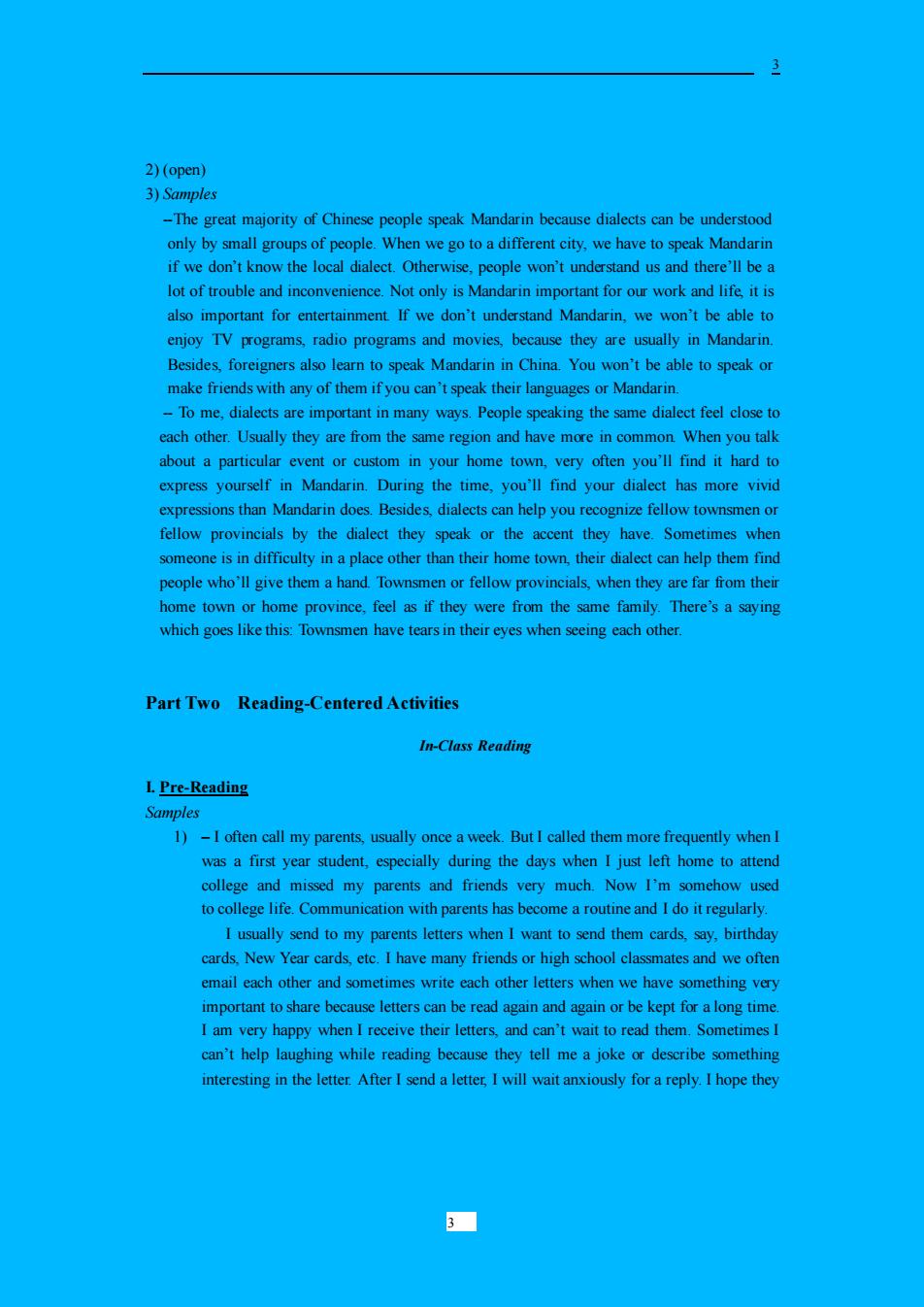
3 2)(open) 3)Samples -The great majority of Chinese people speak Mandarin because dialects can be understood only by small groups of people.When we go to a different city,we have to speak Mandarin if we don't know the local dialect.Otherwise,people won't understand us and there'll be a lot of trouble and inconvenience.Not only is Mandarin important for our work and life,it is also important for entertainment If we don't understand Mandarin,we won't be able to enjoy TV programs,radio programs and movies,because they are usually in Mandarin. Besides,foreigners also learn to speak Mandarin in China.You won't be able to speak or make friends with any of them if you can't speak their languages or Mandarin. -To me,dialects are important in many ways.People speaking the same dialect feel close to each other.Usually they are from the same region and have more in common.When you talk about a particular event or custom in your home town,very often you'll find it hard to express yourself in Mandarin.During the time,you'll find your dialect has more vivid expressions than Mandarin does.Besides,dialects can help you recognize fellow townsmen or fellow provincials by the dialect they speak or the accent they have.Sometimes when someone is in difficulty in a place other than their home town,their dialect can help them find people who'll give them a hand.Townsmen or fellow provincials,when they are far from their home town or home province,feel as if they were from the same family.There's a saying which goes like this:Townsmen have tears in their eyes when seeing each other. Part Two Reading-Centered Activities In-Class Reading I.Pre-Reading Samples 1)-I often call my parents,usually once a week.But I called them more frequently when I was a first year student,especially during the days when I just left home to attend college and missed my parents and friends very much.Now I'm somehow used to college life.Communication with parents has become a routine and I do it regularly. I usually send to my parents letters when I want to send them cards,say,birthday cards,New Year cards,etc.I have many friends or high school classmates and we often email each other and sometimes write each other letters when we have something very important to share because letters can be read again and again or be kept for a long time. I am very happy when I receive their letters,and can't wait to read them.Sometimes I can't help laughing while reading because they tell me a joke or describe something interesting in the letter.After I send a letter,I will wait anxiously for a reply.I hope they
3 3 2) (open) 3) Samples --The great majority of Chinese people speak Mandarin because dialects can be understood only by small groups of people. When we go to a different city, we have to speak Mandarin if we don’t know the local dialect. Otherwise, people won’t understand us and there’ll be a lot of trouble and inconvenience. Not only is Mandarin important for our work and life, it is also important for entertainment. If we don’t understand Mandarin, we won’t be able to enjoy TV programs, radio programs and movies, because they are usually in Mandarin. Besides, foreigners also learn to speak Mandarin in China. You won’t be able to speak or make friends with any of them if you can’t speak their languages or Mandarin. -- To me, dialects are important in many ways. People speaking the same dialect feel close to each other. Usually they are from the same region and have more in common. When you talk about a particular event or custom in your home town, very often you’ll find it hard to express yourself in Mandarin. During the time, you’ll find your dialect has more vivid expressions than Mandarin does. Besides, dialects can help you recognize fellow townsmen or fellow provincials by the dialect they speak or the accent they have. Sometimes when someone is in difficulty in a place other than their home town, their dialect can help them find people who’ll give them a hand. Townsmen or fellow provincials, when they are far from their home town or home province, feel as if they were from the same family. There’s a saying which goes like this: Townsmen have tears in their eyes when seeing each other. Part Two Reading-Centered Activities In-Class Reading I. Pre-Reading Samples 1) – I often call my parents, usually once a week. But I called them more frequently when I was a first year student, especially during the days when I just left home to attend college and missed my parents and friends very much. Now I’m somehow used to college life. Communication with parents has become a routine and I do it regularly. I usually send to my parents letters when I want to send them cards, say, birthday cards, New Year cards, etc. I have many friends or high school classmates and we often email each other and sometimes write each other letters when we have something very important to share because letters can be read again and again or be kept for a long time. I am very happy when I receive their letters, and can’t wait to read them. Sometimes I can’t help laughing while reading because they tell me a joke or describe something interesting in the letter. After I send a letter, I will wait anxiously for a reply. I hope they
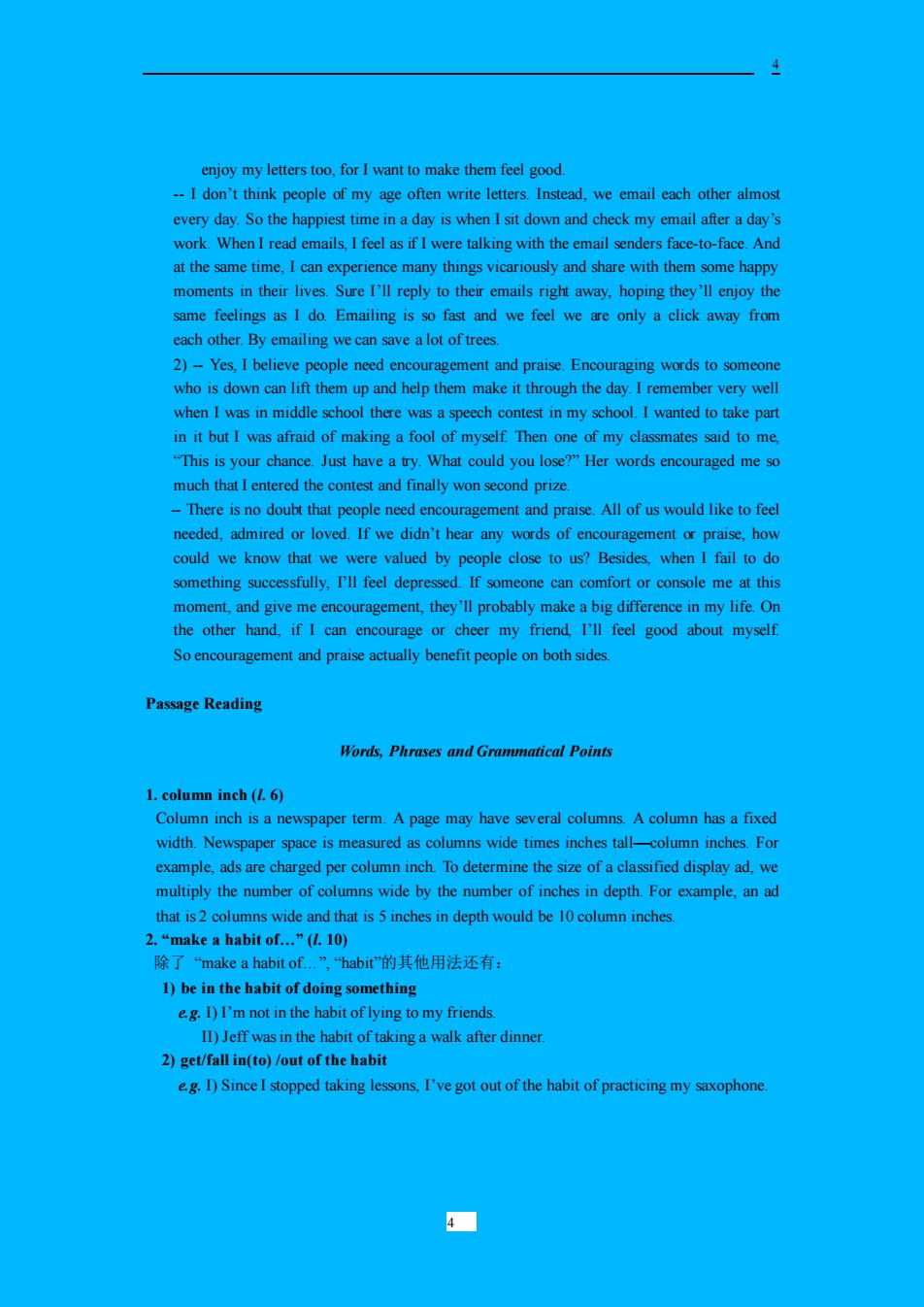
enjoy my letters too,for I want to make them feel good. --I don't think people of my age often write letters.Instead,we email each other almost every day.So the happiest time in a day is when I sit down and check my email after a day's work.When I read emails,I feel as if I were talking with the email senders face-to-face.And at the same time,I can experience many things vicariously and share with them some happy moments in their lives.Sure I'll reply to their emails right away,hoping they'll enjoy the same feelings as I do.Emailing is so fast and we feel we are only a click away from each other.By emailing we can save a lot of trees. 2)-Yes,I believe people need encouragement and praise.Encouraging words to someone who is down can lift them up and help them make it through the day.I remember very well when I was in middle school there was a speech contest in my school.I wanted to take part in it but I was afraid of making a fool of myself.Then one of my classmates said to me "This is your chance.Just have a try.What could you lose?"Her words encouraged me so much that I entered the contest and finally won second prize. -There is no doubt that people need encouragement and praise.All of us would like to feel needed,admired or loved.If we didn't hear any words of encouragement or praise,how could we know that we were valued by people close to us?Besides,when I fail to do something successfully,I'll feel depressed.If someone can comfort or console me at this moment,and give me encouragement,they'll probably make a big difference in my life.On the other hand,if I can encourage or cheer my friend,I'll feel good about myself So encouragement and praise actually benefit people on both sides. Passage Reading Words,Phrases and Grammatical Points 1.column inch (6) Column inch is a newspaper term.A page may have several columns.A column has a fixed width.Newspaper space is measured as columns wide times inches tall-column inches.For example,ads are charged per column inch.To determine the size of a classified display ad,we multiply the number of columns wide by the number of inches in depth.For example,an ad that is 2 columns wide and that is 5 inches in depth would be 10 column inches. 2.“make a habit of..”(U.10) 除了“make a habit of..”“habit'的其他用法还有: 1)be in the habit of doing something eg.I)I'm not in the habit of lying to my friends. II)Jeff was in the habit of taking a walk after dinner 2)get/fall in(to)/out of the habit eg.I)Since I stopped taking lessons,I've got out of the habit of practicing my saxophone 4
4 4 enjoy my letters too, for I want to make them feel good. -- I don’t think people of my age often write letters. Instead, we email each other almost every day. So the happiest time in a day is when I sit down and check my email after a day’s work. When I read emails, I feel as if I were talking with the email senders face-to-face. And at the same time, I can experience many things vicariously and share with them some happy moments in their lives. Sure I’ll reply to their emails right away, hoping they’ll enjoy the same feelings as I do. Emailing is so fast and we feel we are only a click away from each other. By emailing we can save a lot of trees. 2) -- Yes, I believe people need encouragement and praise. Encouraging words to someone who is down can lift them up and help them make it through the day. I remember very well when I was in middle school there was a speech contest in my school. I wanted to take part in it but I was afraid of making a fool of myself. Then one of my classmates said to me, “This is your chance. Just have a try. What could you lose?” Her words encouraged me so much that I entered the contest and finally won second prize. -- There is no doubt that people need encouragement and praise. All of us would like to feel needed, admired or loved. If we didn’t hear any words of encouragement or praise, how could we know that we were valued by people close to us? Besides, when I fail to do something successfully, I’ll feel depressed. If someone can comfort or console me at this moment, and give me encouragement, they’ll probably make a big difference in my life. On the other hand, if I can encourage or cheer my friend, I’ll feel good about myself. So encouragement and praise actually benefit people on both sides. Passage Reading Words, Phrases and Grammatical Points 1. column inch (l. 6) Column inch is a newspaper term. A page may have several columns. A column has a fixed width. Newspaper space is measured as columns wide times inches tall—column inches. For example, ads are charged per column inch. To determine the size of a classified display ad, we multiply the number of columns wide by the number of inches in depth. For example, an ad that is 2 columns wide and that is 5 inches in depth would be 10 column inches. 2. “make a habit of…” (l. 10) 除了 “make a habit of…”, “habit”的其他用法还有: 1) be in the habit of doing something e.g. I) I’m not in the habit of lying to my friends. II) Jeff was in the habit of taking a walk after dinner. 2) get/fall in(to) /out of the habit e.g. I) Since I stopped taking lessons, I’ve got out of the habit of practicing my saxophone
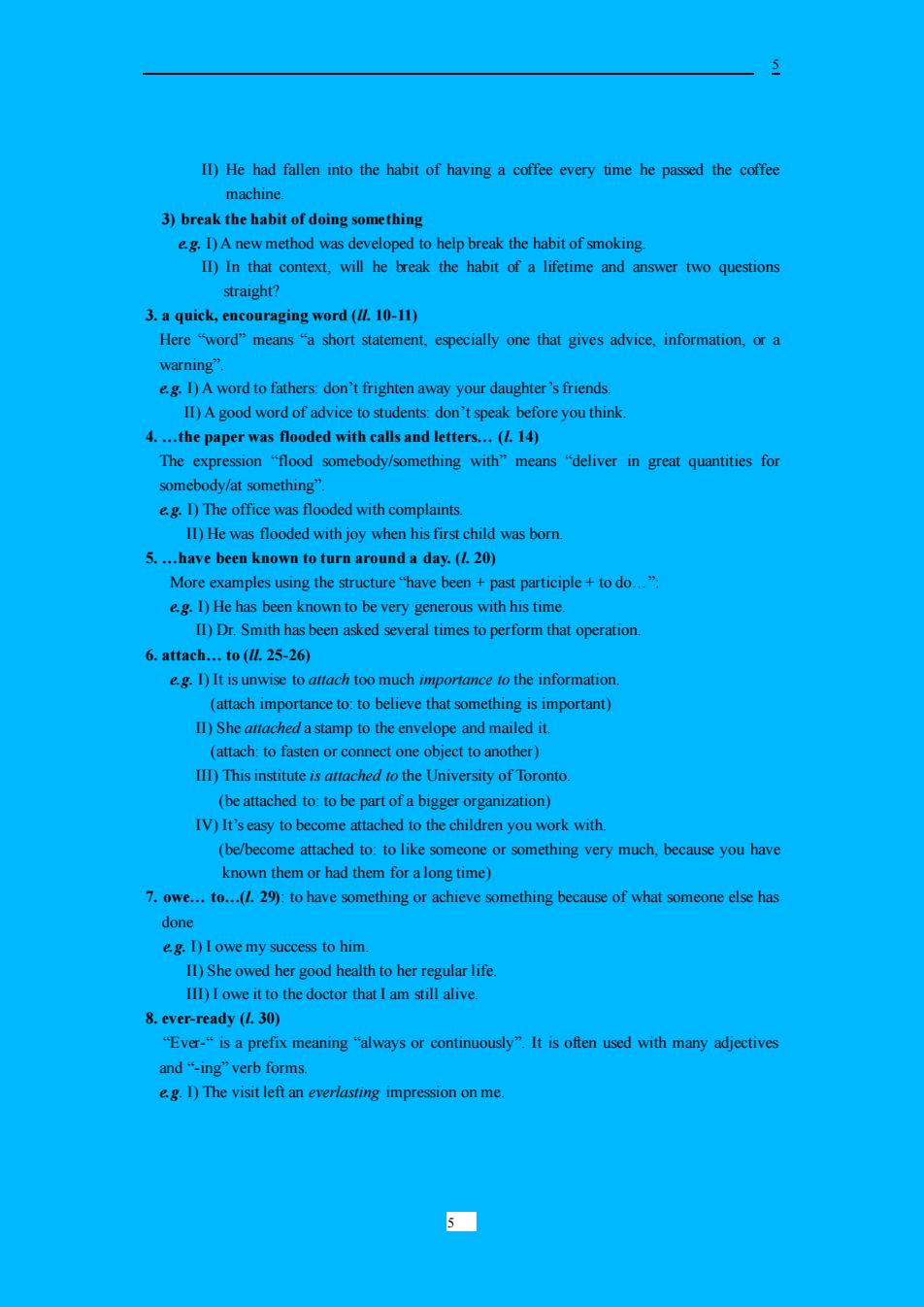
II)He had fallen into the habit of having a coffee every time he passed the coffee machine. 3)break the habit of doing something eg.I)A new method was developed to help break the habit of smoking. II)In that context,will he break the habit of a lifetime and answer two questions straight? 3.a quick,encouraging word (ll.10-11) Here "word"means "a short statement,especially one that gives advice,information,or a warning". eg.I)A word to fathers:don't frighten away your daughter's friends. II)A good word of advice to students:don't speak before you think. 4....the paper was flooded with calls and letters...(L.14) The expression "flood somebody/something with"means "deliver in great quantities for somebody/at something". eg.I)The office was flooded with complaints. Il)He was flooded with joy when his first child was born. 5....have been known to turn around a day.(L 20) More examples using the structure"have been+past participle+to do...". e.g.I)He has been known to be very generous with his time. II)Dr.Smith has been asked several times to perform that operation. 6.attach...to (I.25-26) e.g.I)It is unwise to attach too much importance to the information. (attach importance to:to believe that something is important) II)She attached a stamp to the envelope and mailed it. (attach:to fasten or connect one object to another) Ill)This institute is attached to the University of Toronto (be attached to:to be part of a bigger organization) IV)It's easy to become attached to the children you work with. (be/become attached to:to like someone or something very much,because you have known them or had them for a long time) 7.owe...to...(I.29):to have something or achieve something because of what someone else has done eg.I)I owe my success to him. Il)She owed her good health to her regular life. III)I owe it to the doctor that I am still alive. 8.ever-ready (I.30) “Ever-“is a prefix meaning“always or continuously”.It is often used with many adjectives and“-ing”verb forms. e.g.I)The visit left an everlasting impression on me. 5
5 5 II) He had fallen into the habit of having a coffee every time he passed the coffee machine. 3) break the habit of doing something e.g. I) A new method was developed to help break the habit of smoking. II) In that context, will he break the habit of a lifetime and answer two questions straight? 3. a quick, encouraging word (ll. 10-11) Here “word” means “a short statement, especially one that gives advice, information, or a warning”. e.g. I) A word to fathers: don’t frighten away your daughter’s friends. II) A good word of advice to students: don’t speak before you think. 4. …the paper was flooded with calls and letters… (l. 14) The expression “flood somebody/something with” means “deliver in great quantities for somebody/at something”. e.g. I) The office was flooded with complaints. II) He was flooded with joy when his first child was born. 5. …have been known to turn around a day. (l. 20) More examples using the structure “have been + past participle + to do…”: e.g. I) He has been known to be very generous with his time. II) Dr. Smith has been asked several times to perform that operation. 6. attach… to (ll. 25-26) e.g. I) It is unwise to attach too much importance to the information. (attach importance to: to believe that something is important) II) She attached a stamp to the envelope and mailed it. (attach: to fasten or connect one object to another) III) This institute is attached to the University of Toronto. (be attached to: to be part of a bigger organization) IV) It’s easy to become attached to the children you work with. (be/become attached to: to like someone or something very much, because you have known them or had them for a long time) 7. owe… to…(l. 29): to have something or achieve something because of what someone else has done e.g. I) I owe my success to him. II) She owed her good health to her regular life. III) I owe it to the doctor that I am still alive. 8. ever-ready (l. 30) “Ever-“ is a prefix meaning “always or continuously”. It is often used with many adjectives and “-ing” verb forms. e.g. I) The visit left an everlasting impression on me